Official Transcript of Concluding Address by Hazrat Khalifatul Masih V (aba) at Majlis Khuddamul Ahmadiyya UK National Ijtema 2025
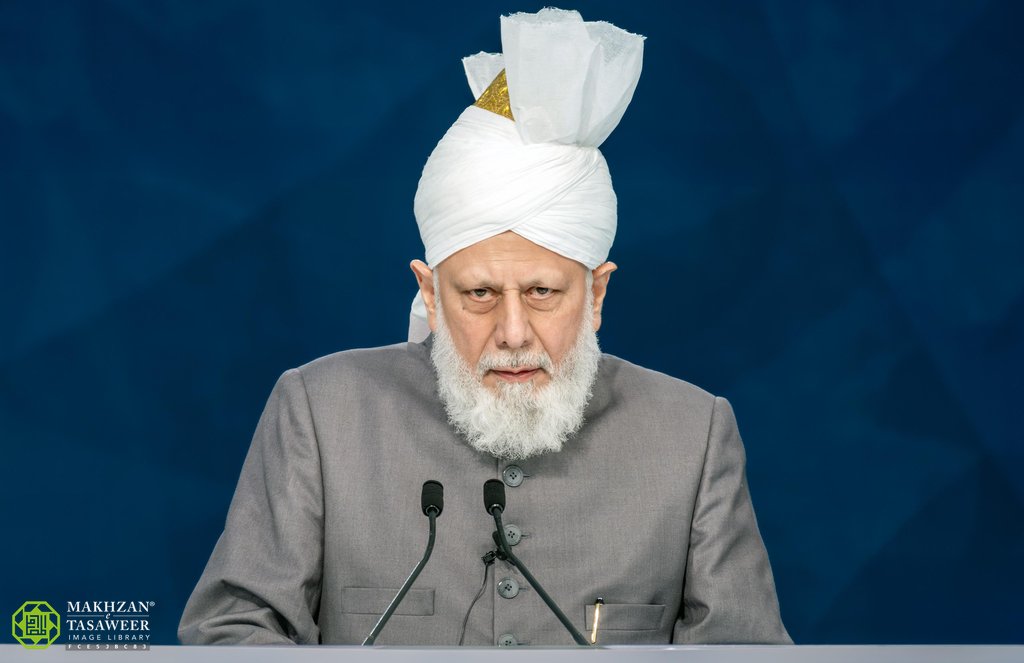
*Please note that this transcript may not be reproduced without express permission either on other websites or in print format.
After reciting Tashahhud, Ta`awwuz and Surah al-Fatihah, Hazrat Khalifatul Masih V (aba) said:
‘Today, you have gathered here to participate in the National Ijtema [1] of Majlis Khuddamul Ahmadiyya. [2] The core objective of all Ijtemas held by the auxiliary organisations within our Jama’at is to instil a love of Allah and to elevate the intellectual, moral, and spiritual standards of their members. This is the principal purpose you, as members of Majlis Khuddamul Ahmadiyya and Atfalul Ahmadiyya [3], should always keep at the forefront of your minds.
In terms of Atfal, the education children receive in this country has the effect of broadening their minds at a young age. I have personally seen children as young as 10 ask very insightful and perceptive religious questions that demonstrate their ability to comprehend many religious concepts at an early age.
With this in mind, today I wish to discuss how our Khuddam and Atfal can best fulfil their religious objectives in today’s world. As I have said, the core purpose of being a member of Majlis Khuddamul Ahmadiyya or Atfalul Ahmadiyya is to enhance your religious, intellectual, and spiritual standards.
At Ijtemas, alongside religious and academic programmes, you also have the opportunity to participate in sports and games, which I am sure many of you enjoy. However, your main priority should not be on the game itself or on who wins or loses. Instead, the primary objective of sports or games at the events arranged by the auxiliary organisations is to help members develop physical strength and fitness, as this will help them to fulfil the rights of Allah and their religious and educational development.
Unfortunately, in today’s world, many young people spend all their free time online streaming content, watching TV, and playing video games, instead of engaging in healthy outdoor games and activities. Thus, sports and games at our Ijtemas are designed to encourage you to be outdoors, to get fresh air, and improve your physical fitness.
Furthermore, the purpose of getting fit should not be vanity or a desire to assert physical dominance over others; rather, a fit and healthy person has a greater capacity to fulfil their life’s objectives. And as Ahmadis, our primary objective is fulfilling the rights of Allah the Almighty.
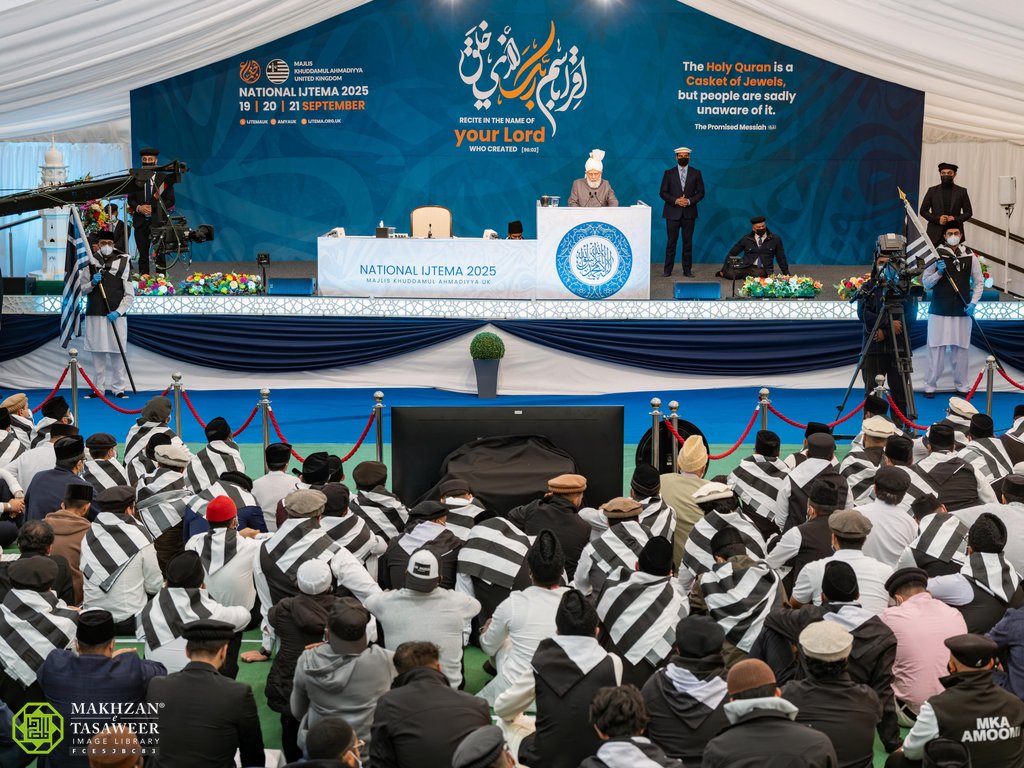
Further, sports and outdoor games offer a positive way to relax and refresh one’s mind, which in turn helps individuals to study and learn more effectively by enhancing focus and mental aptitude. Hence, taking time out for games and sports helps young people in their pursuit of secular education and religious knowledge.
As I said, the real objective of our sports events or competitions is not to win or lose the match or tournament. We should not act like those worldly people who often consider sports as a matter of life or death and who get into heated arguments, brawls, or resort to foul play to gain an advantage.
Regrettably, even among Ahmadis, personal interests or ego can sometimes lead to poor behaviour. For example, earlier this year, I instructed that the Masroor cricket tournament be cancelled because it became apparent that personal interests and inflated egos had overtaken the hearts and minds of some of those involved. Instead of fostering brotherhood, it was causing friction and grudges to develop.
When something leads to bitterness or ill will, it is better to stop it in order to avoid further disputes. Hopefully, those who have deviated from the true objectives may reform and improve themselves.
As Ahmadis, when you play any sport or game, you must exhibit a true spirit of sportsmanship. Indeed, an exceptional standard of manners, tolerance, and respect for others should distinguish our Ahmadi youth from others. Otherwise, if we do not manifest higher moral standards, then what is the benefit of being an Ahmadi?
Thus, I reiterate that sports programmes are organised to enhance the physical and mental well-being of our Khuddam and Atfal, so they can fulfil their duties to Allah, to humanity, and serve the Jama’at in an excellent way. Conversely, idly watching TV or scrolling endlessly on electronic devices can damage your physical and mental health.
Moreover, the Internet is replete with dangerous and immoral content, freely available, that serve to erode moral values and fuel hate. Now, AI is adding a new dimension. This is something I have warned about for many years, and now we are seeing the horrifying results on a near-daily basis.
In recent times, there have been horrific reports of teenagers committing suicide due to cyberbullying, all-consuming, appalling online content that causes serious mental harm. For example, recently, it was reported in the media that a teenager in the United States committed suicide with the help and encouragement of ChatGPT.
Moreover, violent videos or extremist ideologies promoting hate have flooded the internet and are causing immense harm to the individuals who view them and the wider society. Just a few days ago, after a prominent political activist was killed in America, the state governor publicly urged young people to switch off their devices, to go outside to spend time with their families and serve their communities.
With the grace of Allah, Ahmadis, under the guidance of Khilafat, are warned from a young age about the dangers and perils that exist in contemporary society. For example, if we look back to the time of Hazrat Musleh Maud (ra), we observe that he paid very close attention to the moral training of different groups of people, according to their needs, capabilities and environment. With great wisdom, he outlined their responsibilities and objectives.
As part of this, he established Majlis Khuddamul Ahmadiyya and directed Ahmadi youth according to their age and potential. As I am sure most of you will be aware, he bestowed upon you, upon Khuddamul Ahmadiyya, a momentous and profound slogan that “Nations cannot be reformed without the reformation of their youth.”
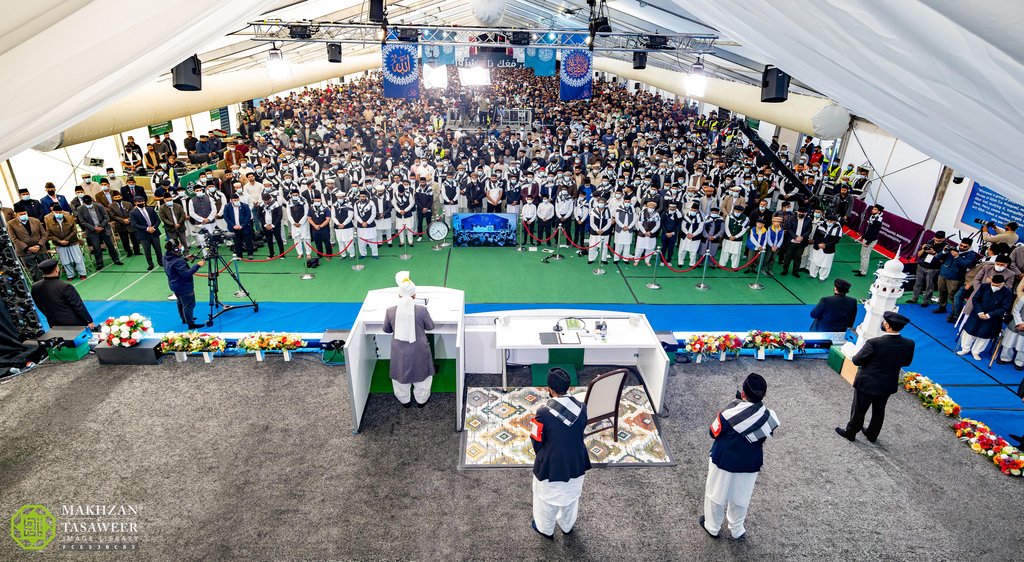
This slogan was and remains an immense and profound challenge for all Khuddam to rise to. These words bear witness to the fact that it lies upon you as Khuddam to spiritually and morally reform your nations. It lies upon you to guide the world towards true peace and prosperity. It lies upon you to strive tirelessly to fulfil the mission of the Promised Messiah (as) until your last breath.
However, before you turn to others, you must look inwards at your own state. It is the inner and personal reformation of every Ahmadi youth that shall lay the foundation, brick by brick, for a glorious spiritual, moral and intellectual revolution in the world. This is what the slogan given to you by Hazrat Musleh Maud (ra) truly represents.
As I have said, being physically fit and well will help you achieve these objectives. Various studies and reports prove that people who are physically fit and who are intellectually disciplined and hardworking are better able to control their emotions and make sound judgments. This not only benefits them but also enables them to contribute positively to the wider world, as they tend to have a more mature and insightful thought process.
Ultimately, when they think deeply and intelligently, especially as members of Khuddamul Ahmadiyya, who have pledged to prioritise their faith over all worldly matters, they are drawn towards the existence of God. Therefore, the core philosophy underpinning the profound slogan given to you by Hazrat Musleh Maud (ra) is that if our Khuddam and Atfal diligently seek to develop their characters and conduct, then every Ahmadi youth has the potential to become a shining star of Ahmadiyyat. Thus, every programme and speech at the Ijtema is geared towards cultivating a mature state of mind and facilitating your spiritual, moral, physical and intellectual development.
And always remember that the primary means of gaining religious knowledge is the study of the Holy Qur’an. This is why our local events and Ijtemas routinely include academic competition related to its recitation and study. Just as we require food and water to fuel our physical bodies, Allah has bestowed upon us through the Holy Prophet (sa) the Holy Qur’an, as a source of everlasting spiritual sustenance to nourish our souls. Consequently, it was to emphasise to all of you the indispensable nature of the Qur’an and its limitless blessings that I chose “The Holy Qur’an, a Casket of Jewels” as the theme for this year’s Ijtema.
Often, when children reach the age of seven or eight and complete the first reading of the Holy Qur’an, they or their parents write to me requesting their Ameen. [4] It should not be that they consider the Ameen as the final step or objective; rather, completing the Qur’an for the first time should mark just the beginning of a lifelong, ever-deepening bond with the words of God.
So, all Khuddam and Atfal should recite the Holy Qur’an daily, understand its meaning, and sincerely strive to act upon its teachings. Instead of wasting time, watching inappropriate films or programmes, or wasting countless hours on the internet and social media, make it your firm objective to increase your knowledge of the Holy Qur’an and its teachings.
Consider the Qur’an to be the means of your reformation and of forging a close bond with Allah the Almighty. It will guide and direct you towards contributing positively to society. So, read and cherish every word. As a believer, this should always be your objective.
Sometimes the translation can be difficult to understand, and so, in addition, you should read the Qur’anic commentaries published by the Jama’at. Yours is the prime age to acquire knowledge, as your brains are fertile and able to absorb and retain new information far more easily than when a person becomes older.
Apart from studying the Qur’an, you must also study the blessed life and character of the Holy Prophet (sa), because his entire life is a timeless example for us to learn from and emulate. Indeed, Allah the Almighty has stated that if a person wishes to gain His nearness, they should strive to tread upon the path of the Holy Prophet (sa).
It is narrated that a person asked Hazrat A’ishah (ra) about the Holy Prophet’s (sa) morals. In reply, she asked, “Have you not read the Holy Qur’an? The Holy Prophet’s (sa) character was the Holy Qur’an.” [5]
By this, she meant that every word and deed of the Holy Prophet (sa) was in perfect harmony with the teachings of the Holy Qur’an. So, it is the noble example of the Holy Prophet (sa) that we should always try to follow. Only then can we live as true Ahmadi Muslims. Only then can we fulfil our pledge to give precedence to faith over worldly matters. Only then can we assist in the divine mission of the Promised Messiah (as).

Furthermore, only if you sincerely commit to applying what you have learned here in your daily life will there be a lasting benefit of having participated in the Ijtema. It is not enough to merely try to build your connection with God just over these two or three days. Rather, you must prioritise developing your relationship and bond with God every single day. You should set aside a specific time each day for reciting the Holy Qur’an and studying it.
If you sincerely strive for this, you will, Insha’Allah, witness a magnificent spiritual and moral transformation in your life. Your hearts and minds will naturally turn towards Allah, and He will protect you from the pitfalls and traps that lie at every corner and turn of modern society. He will save you from the superficial and deceptive attractions of today’s world.
In terms of worship, once a person asked Hazrat A’ishah (ra) to describe how the Holy Prophet (sa) would offer namaz [6] and worship. In reply, Hazrat A’ishah (ra) said it was better not to ask about the length, quality, and beauty of his worship.
By this, she meant that it was impossible to do justice in words to how the Holy Prophet (sa) would pray for incredibly long periods with intense fervour and concentration, and how he would remain utterly immersed and engulfed by the love of Allah, the Almighty. Of course, we cannot match His unique and supreme standards of worship, but we must constantly try to follow his example as Allah has proclaimed him the ultimate role model and best example for all mankind.
Essentially, the foremost principle the Holy Prophet (sa) taught and exemplified was that we must remember Allah and fulfil the rights of His worship at all times and in all circumstances.
In the Holy Qur’an, Allah the Almighty testifies to how the Holy Prophet (sa) was immersed in His remembrance and worship. Thus, Allah says in the Holy Qur’an,
قُلۡ اِنَّ صَلَاتِیۡ وَنُسُکِیۡ وَمَحۡیَایَ وَمَمَاتِیۡ لِلّٰہِ رَبِّ الۡعٰلَمِیۡنَ [7]
“Say my prayer and my sacrifice and my life and my death are all for Allah, the Lord of the Worlds.”
Here, Allah Himself testifies to the fact that the Prophet’s (sa) every breath, every act and every word were all purely for the sake of Allah, the Lord of All the Worlds. Moreover, Allah the Almighty commanded the Holy Prophet (sa) to proclaim his complete and utter devotion to Him before the world in order to establish a perfect example for all people in all times.
Having presented the example of the Holy Prophet (sa), Allah the Almighty says that those who claim to accept the Prophet of Islam (sa) must strive to follow his example with a firm conviction that Allah is their Lord, their Creator and the Source of all that is good in their lives.
Therefore, today, if you are fortunate enough to excel in your studies or achieve a high rank in your profession, never attribute your success to your own qualities or virtues. Instead, always consider every success and blessing to be purely due to the grace and mercy of Allah.
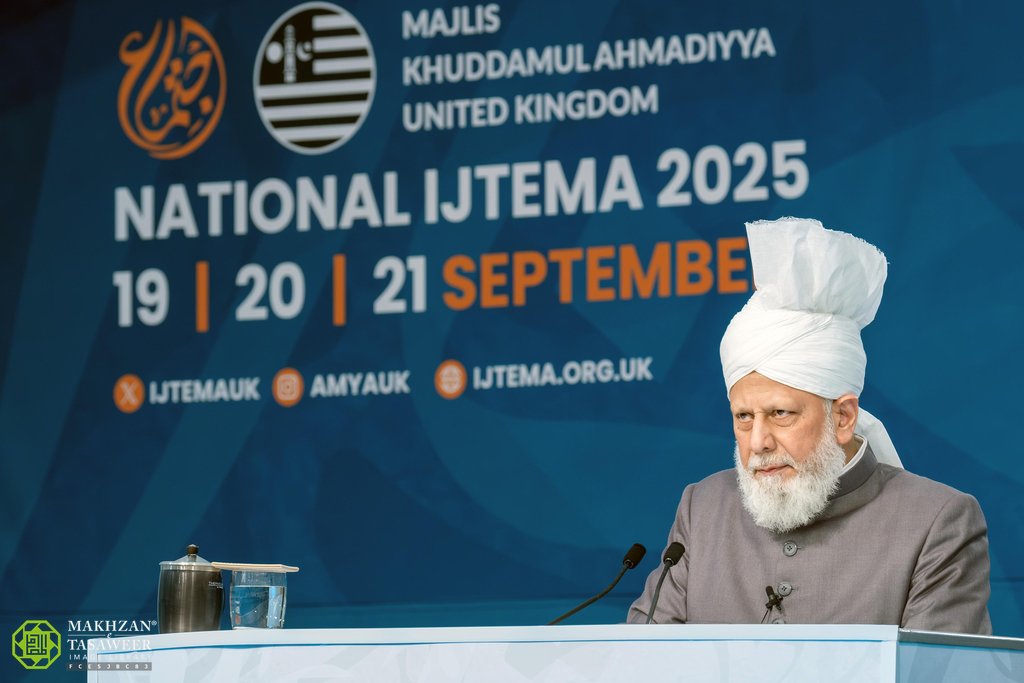
Without a shadow of doubt, if a person truthfully reflects upon their own weaknesses, they will soon recognise Allah’s immense favour and mercy, and they will bow down before Him with ever greater humility and gratitude. Their worship will be purely for His sake, and He will be their priority at all times. Otherwise, if you let your careers or professions or worldly activities become your idol and permit them to lead you away from fulfilling the rights of Allah, it will be an extremely grave matter.
For example, if a person neglects or unduly delays namaz because of worldly pursuits, it shows that he gives priority to such things over God Almighty. The Holy Prophet (sa) expressed great displeasure and anger at such people by stating that neglecting namaz takes a person towards shirk and towards a state of disbelief.
Thus, every Ahmadi must prioritise their five daily prayers and worship and seek to follow the example of the Holy Prophet (sa) about whom Allah the Almighty testified that His prayers, sacrifices and everything were for the sake of Allah alone. So, you must never let work or worldly matters interfere with this sacred duty. Otherwise, raising slogans of Allahu Akbar or claiming to love the Messenger of Allah (sa) are rendered empty and meaningless words. We can only follow his blessed example if we truly consider Allah to be our Lord, the Sole Provider and Sustainer of all mankind and the One Who alone can fulfil all our needs.
Furthermore, another fundamental virtue instructed by the Holy Qur’an is truth. We must hold fast to the truth in every situation, no matter how difficult or challenging. The Holy Prophet (sa) was so utterly flawless that even his enemies could not accuse him of falsehood. Even Abu Jahl, his biggest opponent, admitted he could not call the Holy Prophet (sa) a liar because he had never heard or seen him speak a false word.
Despite this, Abu Jahl could not be rightly guided as he was motivated by extreme enmity and consumed by stubbornness and a love of idol worship. Thus, he would say that while the Holy Prophet (sa) was not a liar, he considered his teachings to be false. Yet it is a matter of common sense that a person known for the highest standards of honesty and integrity would not present a false teaching to the world.
Nonetheless, those bent on rejecting the truth will always find ways to remain in a state of disbelief. Many further incidents demonstrate how, even before his claim to prophethood, the Holy Prophet’s (sa) standard of truth was immaculate. Thereafter, upon his claim of prophethood and spreading Islam’s teachings, he desired for his followers to uphold the highest standards of truth and honesty.
It is narrated that on one occasion, while sitting with some of his companions, the Holy Prophet (sa) said, “Shall I inform you about the most grievous and grave sins?” Firstly, he mentioned shirk, associating partners with Allah. Then he mentioned disobeying one’s parents. Next, the Holy Prophet (sa) said that to kill someone unjustly was a grave sin. Of course, it is obvious to all of us that murder is a heinous crime and is something we all understand. Finally, the Holy Prophet (sa) stated that making a false oath or promise is also a very major sin.
The fact that it was listed alongside shirk and unjustly taking a life proves just how much falsehood is detested by God Almighty. The Holy Prophet (sa) explained that if a person lies or makes promises that they do not intend to fulfil, it is because they seek to unjustly seize the rights of others. They are driven to falsehood in order to serve their own interests at the expense of others. Thus, every Ahmadi, young or old, must ensure that in business, financial, or other dealings, they maintain the highest standards of truth and integrity.
The Holy Prophet (sa) desired to instil the virtue of truth to such an extent that once, when he overheard a woman call her son by promising to give him something, he called her and said that if she had not actually given the child something, it would have counted as a lie. Moreover, she would have taught her son to deceive others. Hence, never engage in any falsehood, even as a joke, and no matter how trivial it may seem. Absolute honesty ought to be the hallmark of every Ahmadi. Only then will our Jama’at, underpinned by a pillar of countless truthful souls, be in a position to enlighten the world and guide them toward bowing down before Allah the Almighty and worshipping Him.
Another immoral practice that has developed among some of our people is spreading gossip, exaggerating the truth, betraying confidences, and revelling in the distress of others, all for the sake of their cheap amusement or to provoke conflict. In this age of social media, it is easier than ever to spread disinformation and rumours.
People often excuse this behaviour by labelling it as a joke, but such vindictive actions can cause grudges, malice and hatred to ignite. It can even lead to fighting and the breakdown of social order. Hence, you must never engage in such things. Instead, if you are to use social media, use it for spreading positivity and truth. Use it to convey the commands of Allah the Almighty, the teachings of the Holy Prophet (sa) and the moral and spiritual lessons of the Promised Messiah (as). Do not use it as a means of vulgar entertainment or to spread vain and immoral things. Do not use it to distress others or to fuel hatred and deviance. Use social media for good and righteous things alone.
During my recent address to Lajna [8] during the Germany Jalsa Salana [9], I mentioned that while taunting or gossiping behaviour was traditionally associated with women, regrettably, now, due to the effect of social media or partaking in improper gatherings, men are often the worst offenders.
The Holy Prophet (sa) strictly prohibited such conduct, stating that the worst of mankind is a person who has two faces, meaning a person who says one thing to one person and another thing to someone else, either for their amusement, to satisfy their ego or to cause hatred and social unrest.
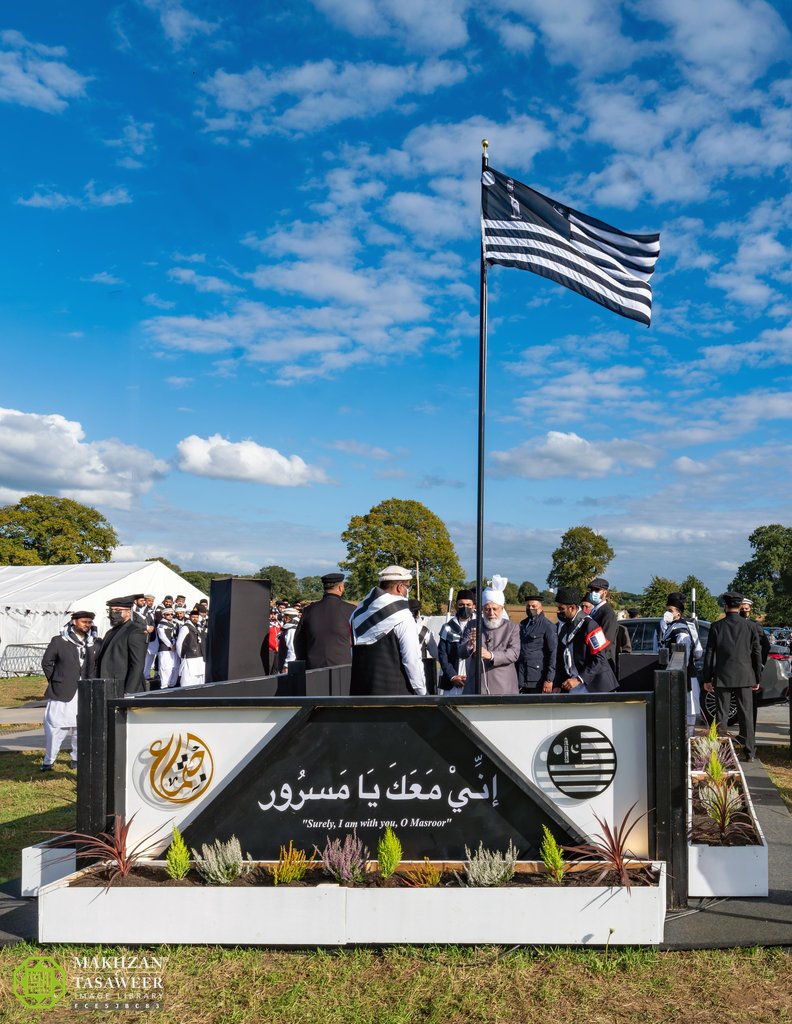
Save yourselves from such shameful conduct, as these are the traits of a hypocrite. Only by avoiding this behaviour can we act upon the commandment to excel in righteousness. Otherwise, our claim and stated ambition to bring forth a spiritual revolution in the world shall be rendered meaningless.
If we wish to change the world for the better, we should first ask ourselves how the Holy Prophet (sa) ignited a spiritual revolution in his companions’ hearts. Those same people who once were mired in a pit of ignorance, immorality and illiteracy transformed into the most noble and moral people on the face of the earth and soared to such spiritual heights that those armed with worldly knowledge alone could never reach. This transformation was a direct result of their unwavering dedication to seeking the Holy Prophet’s (sa) guidance at every turn.
For example, once a person asked the Holy Prophet (sa) how to ensure that he would go to heaven – people now commonly ask this question. In reply, the Holy Prophet (sa) said he must worship Allah alone and never associate partners with Him,– one thing. He told him to perform Salat in congregation and to give Zakat, to spend in the way of Allah. Further, the Holy Prophet (sa) instructed him to show love and mercy to his relatives. If he did all this, he would enter paradise.
In terms of showing love to one’s relatives, it includes all of one’s relations. It is a cause of deep regret that some young Ahmadi women write to me expressing their grief because their husbands or in-laws forbid them from seeing their own families. Such behaviour is a direct violation of the teachings of Islam, and so those guilty of such cruelties should reform themselves and treat their wives and daughters-in-law with love and compassion. If the husband’s parents are the cause of such distress, then they should be reminded that Allah and His Prophet (sa) have given the glad tidings of paradise for those who care for their relatives, and so why do they try to stop their daughters-in-law from doing so?
Remember, if your loved ones prevent you from fulfilling the commands of Allah or His Messenger (sa), then whilst remaining within the confines of good manners, children have a duty to guide their parents. There is nothing inappropriate about this.
Recently, a Khadim asked me, to what extent must a person listen to his parents? I advised him to honour and obey them unless what they said violated the command of Allah and the teachings of Islam. In such circumstances, a child can and indeed should stand for the sake of his faith and reject what his parents say. However, even then, they should try to guide their parents with love and kindness.
Now, as we reach the end of this Ijtema, I wish to reiterate the importance of studying the Holy Qur’an. Unquestionably, when you read the Qur’an carefully, you will find a wealth of divine wisdom within it, guiding you on what to embrace and what to avoid.
I have only touched upon a fraction of its teachings. Only if we collectively, as a Jama’at, our youth, children and elders alike, truly live by its teachings, can we spark a genuine spiritual and moral revolution in the world. Otherwise, without an inner transformation, our claims of changing the world shall amount to nothing but empty words.
We are incredibly fortunate to be Ahmadis, but we can only fulfil our true purpose, strengthen our bond with the Jama’at and benefit from these Ijtemas if we understand and act on the commands of Allah, the teachings of the Holy Prophet (sa) and the Promised Messiah (as). It is our duty and mission to embrace every single teaching of Islam to the best of our ability and to forever seek to walk upon a path of virtue and righteousness.
If you, as young Ahmadis, achieve this, you will be those sincere and devoted youth who live up to their religious pledges and stand at the vanguard of reforming others and bringing about a spiritual awakening in the world. Otherwise, merely raising the slogan that “nations cannot be reformed without the reformation of their youth” is meaningless and fulfils no purpose.
Our true objective will only be realised when, alongside raising this slogan, we strive with every fibre of our being to reform ourselves and, in turn, to reform mankind. So, as you leave today, ask yourselves whether you will be amongst those Khuddam and Atfal who truly reform themselves and who lead the world towards Allah the Almighty and towards peace and truth.
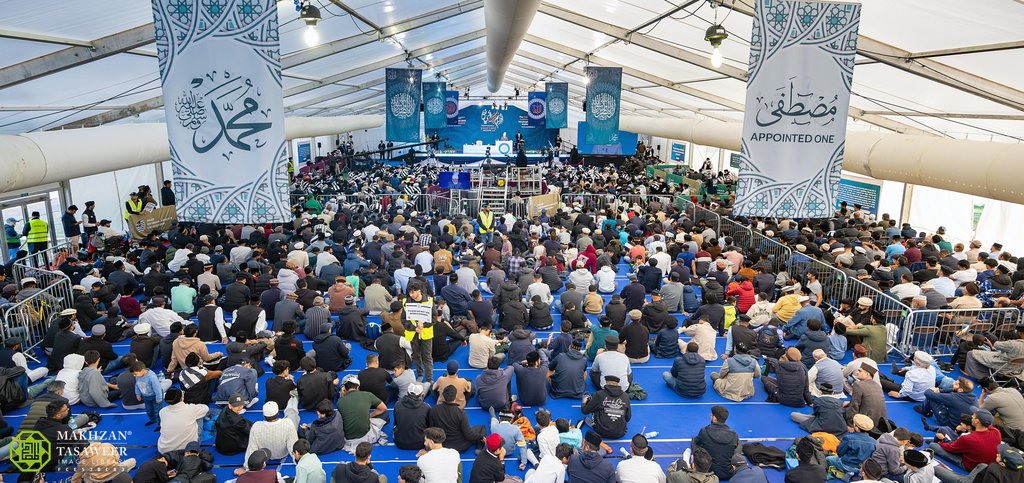
With all my heart, I hope and pray that Allah the Almighty may grant you the ability to do so and may you all become true shining stars of Ahmadiyyat. Ameen.
Now, join me in silent prayer.’
ENDNOTES
[1] Annual Gathering
[2] Ahmadiyya Muslim Youth Association
[3] Ahmadiyya Muslim Children’s Association
[4] Ceremony to commemorate the first complete reading of the Holy Qur’an
[5] Sahih Muslim, Hadith 746a
[6] Prayer
[7] The Holy Qur’an, 6:163
[8] Ahmadi women
[9] Annual Convention
